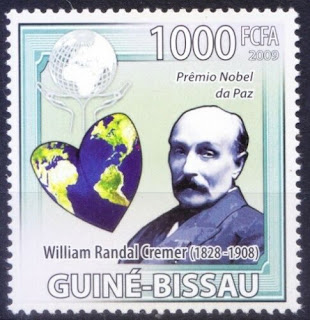1793 – Alexander Mackenzie reaches the Pacific Ocean becoming the first recorded human to complete a transcontinental crossing of North America.
Sir Alexander Mackenzie (or MacKenzie, Scottish Gaelic: Alasdair MacCoinnich; 1764 – 12 March 1820) was a Scottish explorer known for accomplishing the first east to west crossing of North America north of Mexico, which preceded the more famous Lewis and Clark Expedition by 12 years. His overland crossing of what is now Canada reached the Pacific Ocean in 1793. The Mackenzie River, the longest river system in Canada and the second longest in North America, is named after him.
Canadian stamps issued to commemorate Alexander Mackenzie
1908 Died: Randal Cremer, English activist and politician, Nobel Prize laureate (b. 1828)
Sir William Randal Cremer (18 March 1828 – 22 July 1908) usually known by his middle name "Randal", was an English Liberal Member of Parliament, a pacifist, and a leading advocate for international arbitration. He was awarded the Nobel Peace Prize in 1903 for his work with the international arbitration movement.
From as early as his first unsuccessful run for Parliament in 1868, Cremer had advocated the expansion of international arbitration as peaceful alternative to war for the resolution of disputes.
He was elected as Liberal Member of Parliament (MP) for Haggerston in the Shoreditch district of Hackney from 1885 to 1895, and then from 1900 until his death from pneumonia in 1908.
Using his platform as an MP, Cremer cultivated allies on both continental Europe and across the Atlantic, including Frédéric Passy, William Jennings Bryan and Andrew Carnegie. Using his network of contacts and his talent for organisation, Cremer did much to create and expand institutions for international arbitration, which during his lifetime were successful in peacefully resolving numerous international disputes. This work includes co-founding the Inter-Parliamentary Union and the International Arbitration League; gaining acceptance for the 1897 Olney–Pauncefote Treaty between the United States and Britain that would have required arbitration of major disputes as the Essequibo territory (the treaty was rejected by the US Senate and never went into effect); and preparing the ground for the Hague peace conferences of 1899 and 1907.
In recognition of his work in the arbitration movement, Cremer won the Nobel Peace Prize, the first to do so solo, in 1903. Of the £8,000 award he donated £7,000 as an endowment for the International Arbitration League.
He also was named a Chevalier of the French Légion d'honneur, won the Norwegian Knighthood of Saint Olaf and was knighted in 1907.
Stamp issued by Guinea Bissau depicting Randal Cremer
1933 – Aviator Wiley Post returns to Floyd Bennett Field in New York City, completing the first solo flight around the world in seven days, 18 hours and 49 minutes.
Wiley Hardeman Post (November 22, 1898 – August 15, 1935) was a famed American aviator during the interwar period, the first pilot to fly solo around the world. Also known for his work in high-altitude flying, Post helped develop one of the first pressure suits and discovered the jet stream. On August 15, 1935, Post and American humorist Will Rogers were killed when Post's aircraft crashed on takeoff from a lagoon near Point Barrow in the Territory of Alaska.
Post's Lockheed Vega aircraft, the Winnie Mae, was on display at the National Air and Space Museum's Steven F. Udvar-Hazy Center from 2003 to 2011. It is now featured in the "Time and Navigation" gallery on the second floor of the National Air and Space Museum in Washington, D.C.
Stamps issued to commemorate Wiley Post





No comments:
Post a Comment